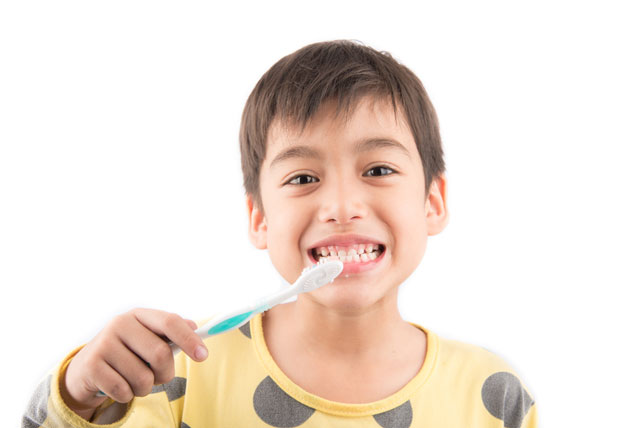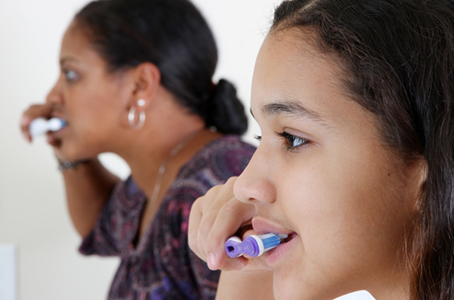6 Tips for a Cavity-Free Childhood
We all want our kids to have cavity-free teeth, don’t we? The odds are not exactly in our favor. Did you know that the most common disease among children and teens is tooth decay? The Centers for Disease Control and Prevention (CDC) reports that nearly 20% of children’s cavities are left untreated. Still, as parents, we can do a lot to prevent these dental health complications. It takes time and effort, but it’s possible to help children maintain good oral health.
Every year, children lose over 51 million school hours due to dental problems. Considering that cavities are 100% preventable, we wanted to do our share and help parents teach their children proper dental care. Your child’s dental health complications have consequences beyond a little toothache, and we want to prevent anything that bothers them.
As parents, we understand how hard it is to keep your child engaged with menial tasks like brushing teeth. Nevertheless, these habits remain necessary for preventing harmful, painful cavities. How can you keep your infant’s mouth clean?
We wanted to focus on some areas where parents can invest a little more time and attention to help their children. Below are some tips to keep your child’s mouth clean and set them up for a healthy smile later in life.
Don’t Delay a Visit to the Pediatric Dentist
According to the American Academy of Pediatric Dentists (AAPD), parents should find their child a dental home by age one or when the kid’s first tooth emerges. These early visits allow the pediatric dentist to establish a trusting relationship with your child early on and set a pattern of regular visits.
Often, parents will wait until their kid shows signs of dental health problems to visit a professional. This delay can lead to dental anxiety because it throws the kid directly into an environment where they require immediate treatment, a situation made worse by any media that portrays dental visits as a negative experience.
Regular dental visits from a young age also help follow the kid’s dental development. If the dentist notices the potential for any dental health problems, they can minimize the negative effects with professional treatments. Likewise, we can focus on the kid’s nutritional habits and current dental care routine to prevent other complications.
Furthermore, you should keep in mind that skipping out on professional cleanings can be more costly and time-consuming in the long run. The smart move is to invest in your kid’s oral health as soon as possible to avoid financial strain and painful experiences further down the line.
Schedule an appointment with a pediatric dentist every six months to provide your child with all the support they require.
Visit Our Pediatric Dental Office in Katy
If you’ve just had a baby, and are unsure about how to care for their mouth properly and prevent childhood cavities, then visit our office.
We’ve had a great experience with parents who are aware of their child’s dental needs. If you need help, we’ll be glad to do everything we can to help your family. Our pediatric office in Katy has a design that caters to children and creates a relaxing and unintimidating atmosphere which they look forward to visiting. If you’re wondering “where is the best pediatric dentists near me”, you’re in for a treat
Take Advantage of Dental Sealants and Fluoride
Preventative dentistry is one of our most powerful tools in the fight against baby tooth decay. Nothing beats a good dental care routine and careful dietary planning, but your baby’s pediatric dentist has some powerful resources at their disposal.
Keep in mind two things are playing against your baby’s teeth. First, primary teeth are much more susceptible to harmful bacteria attacks. Baby teeth have a weaker enamel layer than those of adults, meaning that bacteria can more quickly degrade the outer layers and infect the soft tissues within. Second, infants are not big on the idea of dental care.
Even though there’s much that parents can do for their kid’s oral care, some cases require professional intervention. Let’s talk about a couple of treatments that can help your kid.
The Benefits of Dental Sealants
Sealants are one of the most effective and underrated ways of preventing cavities. A dental sealant is a temporary, thin plastic coating “painted” on the outer enamel of teeth to create a barrier between the bacteria and teeth. This material helps cover molar teeth because those are harder to clean, making them prone to cavities.
All the nooks and crannies on the surface of a child’s molar teeth are great at harboring leftover food particles that serve as food for harmful bacteria. Your child might feel their bite is a little different, but it’s well worth it.
Help Your Child Receive Enough Fluoride
Fluoride is a known natural mineral that helps to reduce cavities dramatically. It works by helping your child’s enamel reabsorb lost minerals and keep strong.
Many people do not realize it, but most of the water coming from faucets in the US has fluoride. A downside of bottled water is that it usually does not contain fluoride, so if your child only drinks bottled water, they miss out on cavity prevention. Fluoride also comes naturally in many foods, so ask your kid’s dentist about which things you should integrate into their diet.
Avoid Baby Bottle Tooth Decay

Baby bottle tooth decay is pervasive and occurs when the sugars from liquids such as juice or milk coat an infant’s teeth for extended periods. Parents often allow their children to fall asleep drinking from a bottle before naps or bedtime when the natural flow of saliva decreases.
If your child is a fussy sleeper, you can still allow them to use a bottle as long as it’s only filled with water. Though baby teeth are temporary, maintaining them is essential to the proper formation and alignment of emerging adult teeth beneath the surface.
Use a Washcloth
You can clean your infant’s gums – or their first teeth – by simply using a cold, clean washcloth. Simply rinse a clean, soft washcloth with cool water and wring it out.
After your child has finished eating or drinking a sugary drink, use the damp washcloth to wipe out their mouth gently. Doing so will remove any sugar or acid that comes from their food leftovers and help prevent early cavities.
Watch Out for What Your Kid Eats
As your kid grows up, they may develop food habits and cravings that damage their dental health. Sweets like caramel and taffy can stick to the teeth long after kids eat them, giving bacteria ample time to feed off them and ruin the teeth.
Candy, however, isn’t the only food that needs moderation. Starchy foods, such as potatoes and crackers, can easily stick in the nooks and crannies of the teeth, which is why we also recommended dental sealants before.
Without proper cleaning, these foods provide sugars for bacteria to feed off, multiply, and later attack the enamel. These high sugar foods can lead to tooth decay without regulation, so you should reserve them for special occasions and not let your child overindulge in them.
Now you know. Sweets, sticky foods, and starchy foods may all help develop tooth decay. In and of themselves, many foods are nutritious and should play a role in your kid’s diet, but without regulation and proper dental care, they can harm your kid’s oral health.
Regular brushing and flossing are essential when your kid has these treats. You should also be on the lookout for seasonal challenges such as the Halloween season. If you’re looking for Halloween activities in Katy and how to prevent damage to your child’s teeth, we’ve got you covered.
Good Early Dental Habits Yield Cavity-Free Teeth
It’s never too early to begin a healthy oral care routine. You should begin caring for your child’s gums long before their first tooth emerges, which is usually around the six-month mark of their life.
Healthy gums are an essential predictor of healthy teeth, and maintaining clean gums will help ensure that your child has healthy, cavity-free baby teeth.
Oral care begins even before teeth appear. Parents can use a soft cloth to clean their baby’s gums to limit bacteria and protect emerging teeth. Young children can use kids’ brushes, which are smaller and softer for little mouths.
Good pediatric dentists recommend using just a pea-sized amount of toothpaste for children if they have a problem not swallowing the foam.
Find the Right Toothbrush

Once your child has a few more baby teeth – usually between 8 and 12 months – then you can graduate from a washcloth to a toothbrush designed for toddlers. There are a lot of toothbrushes designed for babies and toddlers from which to choose.
Generally speaking, toothbrushes designed for babies have much softer bristles and a smaller head than those meant for older children. After finding the right toothbrush, begin brushing your child’s teeth and gums twice per day. Make sure to be extra gentle since their teeth and gums are still developing and are quite sensitive.
Use toothpaste with fluoride especially made for very young children, and not as spicy as adult’s toothpaste. Use only a smear of toothpaste – about the size of a grain of rice – to brush their teeth. When they’ve gotten older and have more teeth, use a pea-sized amount of toothpaste.
Always be sure to rinse their mouth out with cool water after you finish brushing their teeth, and try to keep them from swallowing any toothpaste.
Teach Your Kids to Floss
According to a survey from Delta Dental, 43% of parents said their children had never flossed their teeth. The ADA also reported that one in ten US adults neglect to floss, suggests that habits start young, and if a child neglects to floss, they likely will as adults.
It is never too late to create good habits with you or your children! If your child can tie their shoes, they are ready to learn how to floss. Flossing is vital because it helps to reach the places that a toothbrush simply cannot, and it’s one of the best ways to prevent gum disease.
Cavities truly are preventable when you take care of your teeth the right way. This next year can be a great year for your teeth simply by following these easy steps. Please leave a comment below if you have any questions or call us to set up an appointment today with our pediatric dentist in Katy!
Consider Using Mouthwash
Studies continually show that mouthwash can dramatically reduce cavities when used alongside regular brushing. Choose a mouthwash with the American Dental Association (ADA) seal of acceptance and make using it part of your daily routine.
Be a Role Model for Your Kid

The most effective way to keep your children cavity-free is by practicing good dental habits, too. Children learn from their parents, so if they see you taking good care of your teeth, they’ll want to as well!
Do they see you brush? Are you flossing daily? Kids notice how their parents behave, and they’re likely to emulate your actions. Teach your children how to keep up a great oral hygiene routine firsthand by showing them how much you value your oral health.
Make Brushing Your Teeth Fun!

If you brush for two minutes twice each day, you’re already off to a great start in helping your kid maintain great oral health.
If you brush at the same time each day as part of your routine, this can help to form a daily habit of oral care. It is best to conduct your daily oral routine with your children, so they can see what an example of good oral hygiene looks like.
This recurrence will also help to motivate them to take better care of their teeth. Brushing for a full two minutes can feel like an eternity for young children, so the ADA has created fun videos that are exactly two minutes long. You can find them on the 2Min2X website.
Visit a Pediatric Dentist in Katy
The fantastic Dr. Chen and the amazing Dr. Hunter Griffith have an amazing track record of helping infants, young children, and adolescents maintain good dental health and develop great oral hygiene routines.
If you are a parent in need of professional help to maintain your kid’s oral health, you can trust our specialists. Come in for the best pediatric dentist Katy, TX residents can find and get started on a journey that ensures nothing but the best for your child!
